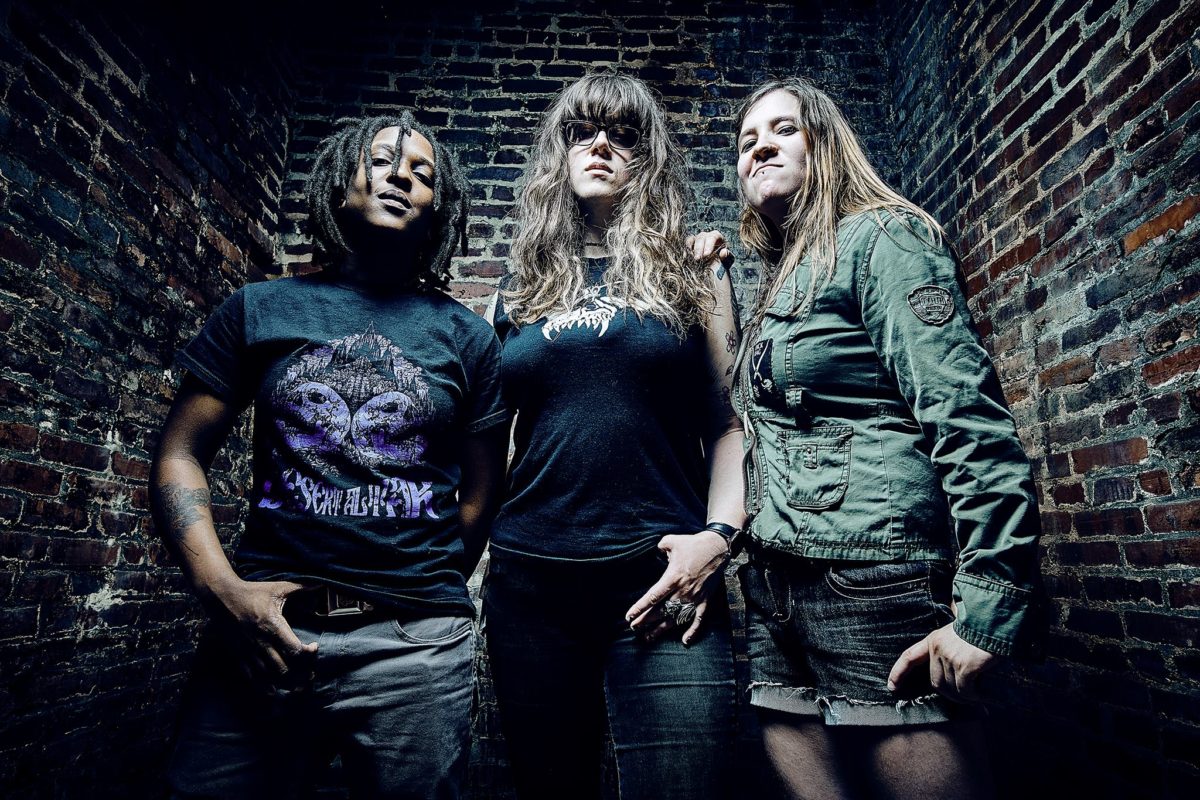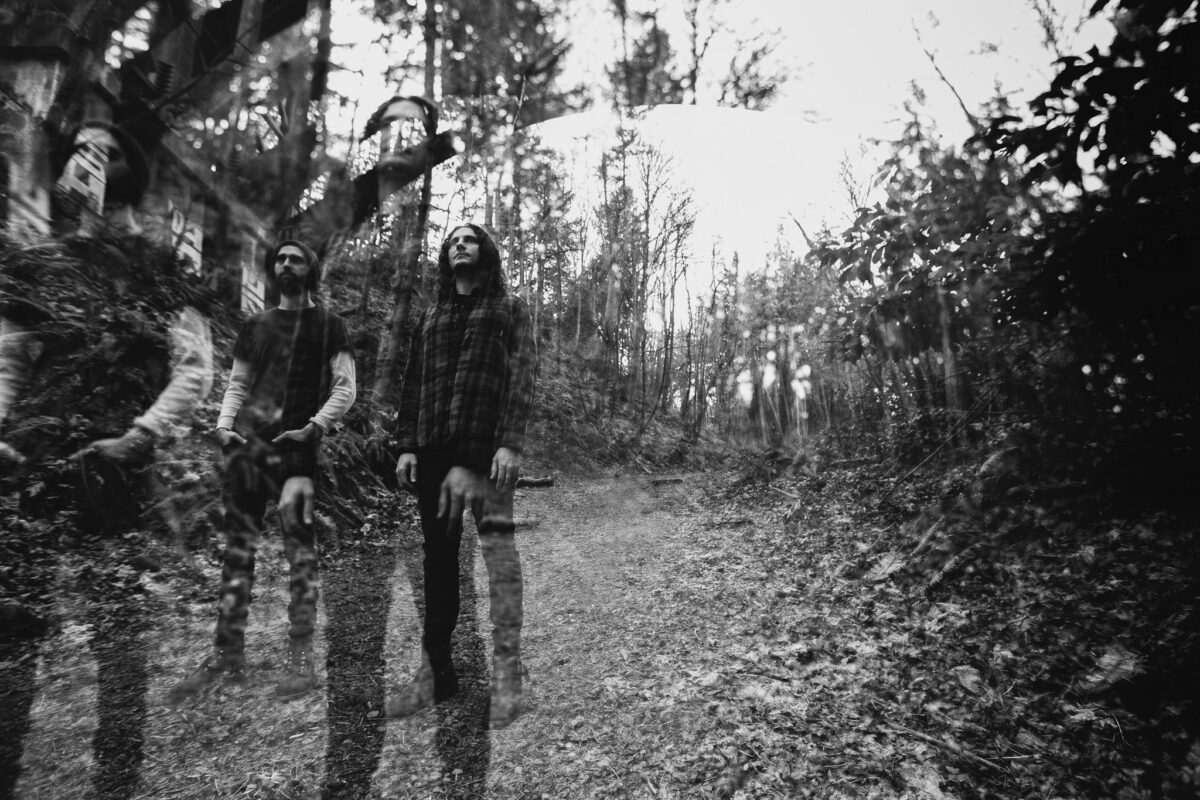Jun
28
Thu June 28th, 2018
8:00PM
Main Space
Minimum Age: 18+
Doors Open: 7:00PM
Show Time: 8:00PM
Event Ticket: $20
Day of Show: $24
Heavy Temple

Heavy Temple on Bandcamp | Heavy Temple on Facebook | Heavy Temple on Instagram | Heavy Temple
Heavy Temple are three sisters of the sonic cloth who want to take you on a trip. “We came here to do three things,” says High Priestess Nighthawk, “Rock ’n Roll is one of them.” After a strong self-titled debut and an even stronger follow up, “Chassit”, the band has plans to record their third album this summer.
Catch the band at RPM Fest and Muddy Roots Music Festival in August, and Shadow Woods Metal Fest and Descendants of Crom in September.
“Philadelphia power trio Heavy Temple perform a refreshingly organic concoction of psychedelic doom-laden swagger, space rock exploration and rumbling 70’s fuzz.” -Liam Yates, Metal Hammer (UK)
“Find out why King’s novels [‘The Dark Tower’] just found their perfect stoner soundtrack.” – Sean Frasier, Decibel Magazine
“There is something strangely mesmerizing about this band’s infectious grooves and swirling soundscapes, making Heavy Temple the sort of band you want to come back to time and time again.” –Matt Bacon, Metal Injection
YOB

“Slow is fast,” says Mike Scheidt, singer, guitarist, and creative nucleus of the Oregon-based doom metal trio YOB. It’s a concept that speaks to both the immense propulsion of their megalithic compositions and the way their artistry has patiently unfurled across their 25-year tenure. Change and revelation take time. You can’t snap yourself into epiphany and you can’t force yourself into another shape. You have to trudge. It doesn’t mean you’re failing. You persevere through the muck or you stop and you sink. There is no third way.
YOB’s music spreads across a plain where vast weather systems converge. Since sharing their first demo in 2000, the band has slowly, graciously gathered a devoted audience into their planetary orbit. Together with bassist Aaron Rieseberg and drummer Dave French, Scheidt tethers pendulous riffs to sky-flung vocals, sinking deep into the trenches and then cresting through the clouds. From the stoner rock ripples of their 2002 debut Elaborations of Carbon through the cavernous echoes of 2018’s Our Raw Heart, YOB wield their totalizing gravity to bore into the light that hides in everything.
Scheidt was reared on punk and metal in the eighties and nineties: parallel outsider ecosystems that lent language and dimension to deep feelings of unbelonging. “Music became for me what I think it is for everybody: an anchor,” he says. “It’s something that soothes; it’s something that lets you feel the intensity of anger without the damage of anger.” He turned toward doom after seeing Cathedral perform in Portland in the early nineties. “I was hanging out in the back. Then Cathedral started playing and it took maybe ten minutes for me to go from the back of the room to wedging myself against the front of the stage,” Scheidt remembers. “It changed my life. Before then I was in punk bands. After that, I started to play slower and lower.”
Toward the end of the nineties, Scheidt started writing songs in the stoner doom tradition of Black Sabbath and Sleep. He dubbed his new project YOB and submitted its first demo to stonerrock.com, one of many online musical communities that sprung up during the explosion of home internet service at the end of the millennium. At the time, Scheidt was busy parenting his three young children and didn’t expect the recording to lead to much. “I just submitted the demo because I wanted to be a part of the community,” says Scheidt. “There was no idea of anything beyond that. Life was very busy and I had other priorities. Everything that came afterwards was surprise after surprise after surprise.”
A warm reception on stonerrock.com sparked label interest, and YOB officially debuted with Elaborations of Carbon, a refinement and expansion of the blues-based stoner rock of their demo. The psychedelic romps of Catharsis followed in 2003, while 2004’s The Illusion of Motion further deepened YOB’s absorbing weight. In 2005, The Unreal Never Lived nudged Scheidt’s devotional practices closer to the forefront of his lyrics. “I’m a longtime practitioner of Buddhism with a nod to Advaita Vedanta,” he says. “I’m a skeptical practitioner in the sense that certain beliefs are either things I don’t grab onto or I take a slow approach. But it was all very much an attempt to solve my own suffering and connect to a deeper world than the one I was raised to believe in.” The album’s title references a quote from Sri Nisargadatta Maharaj, a Hindu spiritual teacher whose work found a wide audience among Western seekers with the 1973 publication of the book I Am That: “The real does not die, the unreal never lived.”
“It’s just about getting to know reality as it is before you can think about it,” says Scheidt of his spiritual practice. “It’s already there. Whatever’s true is true right now, regardless of what we say or believe about it.”
Following two monthlong tours in the middle of the 2000s, YOB disbanded in 2005. News of their breakup drew the curiosity of new listeners, and their audience grew through word of mouth during four years of dormancy. By the time YOB regrouped in 2009, their records were selling better than ever, and they were playing to bigger and bigger rooms. A new chapter began with 2009’s The Great Cessation. YOB worked steadily, slowing the pace of their output and growing their audience organically with more extensive touring. Their 2011 album Atma — named after the concept of the truest, most expansive self in Hinduism and Buddhism — earned a nod on SPIN‘s top 50 albums of the year.
In early 2012, YOB opened for Tool on a string of East Coast shows, where they learned to fill arenas with their singular galactic sludge. Two years later, the 2014 album Clearing the Path to Ascend notched a new peak in the band’s snowballing acclaim. “I remember getting off a plane to play sold out shows at St. Vitus in Brooklyn, and my phone was blowing up that we had got metal record of the year in Rolling Stone,” says Scheidt. “I was like, what is all this about? It was something you can’t ask for. It was just there.”
Anyone who’s gone to a YOB concert knows the distinct quality of attention the band commands. To see them live is to surrender completely, awash in pulverizing sound. The sheer mass of the music dislodges consciousness from its habitual patterns; dissolve into YOB and you’ll find yourself rewritten upon surfacing.
“The crowd and the band are not two things,” says Scheidt. “Over time, playing live has become much less about escape for ourselves and much more about the community of people that have brought us there. Our intention is to offer a space where all of us together can come up for air from the daily struggle. Our music is medicine for us. If it’s that for anyone else, it’s an immense honor.”
Onstage, French, Rieseberg, and Scheidt continually reforge songs from deep in YOB’s catalog. Compositions evolve and grow along with the band, taking on lives of their own over time. “We’re a better band than when we started. We’re a clearer band. We’re much better at focusing within the relaxation that comes from deep water,” Scheidt continues. “Dave is a MacGuyver multi-instrumentalist and an immensely skilled human who seems to have a solution to any obstacle that arises. Aaron is a multi-instrumentalist as well. A deep student of the bass, he whips up thunder with ease, calling on decades of experience as an ever-reaching, forward-thinking musician. Anything I do is inseparable from the wisdom, knowledge, and skills of Aaron and Dave. Together, we are YOB.”
Bell Witch

A melancholic metal duo based in Seattle, Washington, Bell Witch have developed a potent, minimalist vein of doom, sludge, and post-metal. Named for a folkloric poltergeist, the band’s slow, heavy music is all-encompassing; it is by turns melodic, sorrowful, and brooding unto malevolence. Reviewers regularly commented on the juxtaposition of emotional power and brutal physicality in their sound.
Founder/bassist Dylan Desmond claims the band’s M.O. from day one was to compose and play aural ghost stories. A listen to their earliest recordings, such as their 40-minute long-playing demo, underscores this impression; by the time they released 2018’s Mirror Reaper, a single 87-minute track composed while in mourning, they’d come to embody that M.O.
Formed around the talents of drummer/vocalist Adrian Guerra and bassist/vocalist Dylan Desmond in 2010, the duo released an eponymous, album-length demo. Comprised of short intro and outro bookends, at its heart were two excruciatingly molasses-like extended-length jams that offered their now-trademark brand of glacial melancholy and foreboding. Received with great enthusiasm in the metal press and online, they signed to Profound Lore for their debut album, Longing, in 2012, mixed by Brandon Fitzsimons. Plodding, serpentine, and crushingly heavy, two of the album’s six tracks were over ten-minutes long, and one was over 20.
Four Phantoms followed in 2014, as did tours of Europe and the U.S., during which time, Guerra’s increasing alcohol usage became a bone of contention between the pair. Desmond’s longtime roommate, Jesse Shreibman, mixed live sound for the band and acted as a road manager. He interceded for Desmond with Guerra and vice-versa to alleviate tensions and build bridges. However, after completing their touring obligations and beginning work on another album, Desmond, frustrated by what he perceived was his own enabling of Guerra’s continued alcohol abuse, asked his friend to leave in 2015, which he did amicably. Desmond then asked Shreibman to replace him. The latter had long heartfelt conversations with Guerra, which smoothed the transition and earned the latter’s blessing.
In 2016, while composing music, Guerra passed away in his sleep due to a heart attack. He was 36. Desmond and Shreibman basically stopped playing, uncertain of how to proceed given their crushing sense of loss. They eventually reconvened in 2017, completing the group’s third studio long-player, Mirror Reaper. Released at the end of October, the 87-minute single track was recorded as an homage to Guerra and used his scratch vocals throughout. Reviews proved overwhelmingly positive, garnering the band high-profile touring dates all over the globe. In 2018, an archival gig recorded in 2015, Live at Roadburn, was issued, featuring one of Guerra’s final performances.
One of the contributors to Mirror Reaper (and indeed much of Bell Witch’s catalog) was Erik Moggridge, the singer and principal musician behind Aerial Ruin. Given his long association with Bell Witch, the intention for a collaboration between the two acts was for each to showcase songs of the other’s. That idea was pushed to the wayside in favor of an actual collaboration, which made sense given Aerial Ruin and Bell Witch’s similar thematic musical concerns with the loss of self as a requirement for a redemptive spiritual journey.
Together, they conceptually plotted and tackled a story from The Golden Bough, written by Scottish anthropologist Sir James George Frazer in 1890. The tale depicts the lot of a slave who emerges to slay the king only to fall prey to the same trappings of luxury, creature comforts, paranoia, jealousy, the false notion of permanence, and of course became enslaved by them all. The finished project, Stygian Bough Volume One, was released in the summer of 2020.

